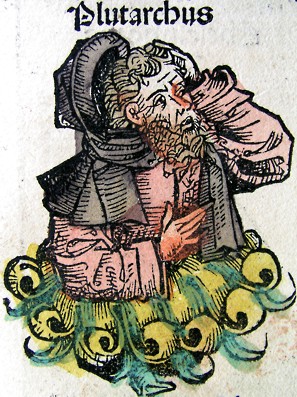Long a favorite of Boston Unitarians (including this one) Plutarch is the subject of my summer reading project this year. I have read a good part of the "Lives" and the "Moralia" already but in my usual disjointed and undisciplined way. Each summer, I set myself a reading project in the often futile hope of bringing some discipline to my reading. This year I am going to keep a blog "commonplace book" of my reading-if you want bits of Plutarch (and who doesn't) go here. This morning, Andrew Preston Peabody on Plutarch...
"But the "Lives," though the best known, are but a small part of Plutarch's works. The treatises included under the general title of " Moralia " are, most of them, on distinctively moral subjects, and cover a very wide range of topics, discussing at"~length what are commonly, though wrongly, called the minor morals, that is, the evils that infest and disturb the happiness of families and of social life, and their opposite virtues, and no less full and thorough on the reputedly larger subjects usually treated in works on moral philosophy. Thus we have, on the one hand, essays on Idle Talking, Curiosity, Self-Praise, and the like; on the other hand, such grave themes as "The Benefits that a Man may derive from his Enemies," and " The Best Means of Self-Knowledge." There is in these essays a blending of common sense and of keen ethical insight; and so little does human nature change with its surroundings, that a very large proportion of Plutarch's counsels, cautions, and precepts are as closely applicable to our own time as if they had been written yesterday. There are, too, letters of consolation, rich, sweet, and tender, and breathing so firm a faith in immortality as to be hardly transcended by the most glowing utterances of St. Paul when the crown of martyrdom seemed close at hand. There is a letter to his wife on the death of a daughter two years old during his absence from home, which contains very little that a Christian father might not have written, and which seems to me to surpass in elevation and purity of thought and feeling, in spirituality and heavenly-mindedness, all other writings of the kind that I have ever seen. I cannot but feel that somehow Easter-morning rays had struggled through the dense Boeotian atmosphere, and that Christ had spoken to the receptive hearts of those whose "eyes were holden so that they could not see him."
Blessings
Wednesday, June 1, 2011
Subscribe to:
Post Comments (Atom)

No comments:
Post a Comment